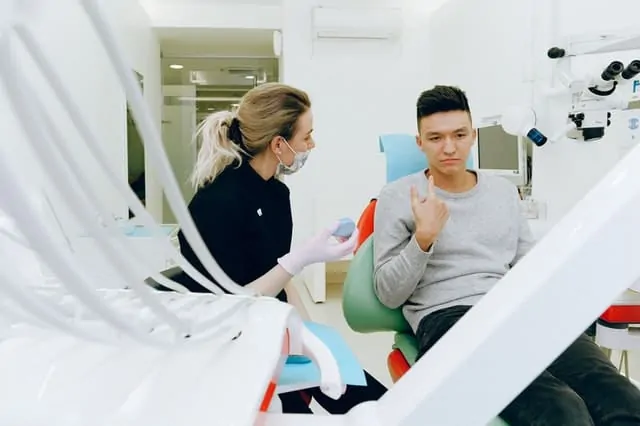Blog
Why Do Our Teeth Fall Out?

There’s a myth out there that says we’re almost guaranteed to lose some of our teeth as we get older. But a study by the American Dental Association says otherwise. In fact, more adults are keeping more of their natural teeth longer now than ever before. But that doesn’t ultimately mean that we’re all safe from tooth loss. Join your dentist in Douglasville as we take a closer look at some of the main reasons why our teeth fall out, some of which have nothing to do with age.
Periodontal Disease
Periodontal disease, also known as gum disease, accounts for 70% of all adult tooth loss in America and is the main reason our teeth fall out. Gum disease is an infection of the gum tissue that can damage both the gum tissue and the jaw bone that hold our teeth in place. While anyone can develop gum disease, it does tend to affect older Americans more. For example, a little over 8% of Americans between the ages and 20 and 64 have gum disease compared to 17% for those over 65. The best way to combat the side effects of gum disease is to seek treatment from your dentist in Douglasville early.
Cavities
Cavities are something that affects over 91% of Americans at least once in their lives, and they’re usually just a minor inconvenience. However, as with many things related to our health, if a cavity isn’t treated while it’s still small it can lead to other, more complex problems. As a cavity grows larger and deeper into the tooth, it will start to affect the tooth’s pulp, roots, and nerves. This can be painful and may require root canal treatment or tooth extraction and therefore, the loss of a tooth.
Accidents
Our teeth can also fall out as a result of an accident. Many times these accidents occur from playing sports without a mouthguard but can also happen because of a fall, car accident, or other unexpected mishaps that involve trauma to the mouth. While nobody ever anticipates an accident and you can’t necessarily prevent them from happening, you can (and should) wear a mouthguard when playing sports.
Other Causes
Believe it or not, there are some reasons our teeth fall out that seemingly have nothing to do with our mouths. You see, there are several whole-body health problems that cause problems throughout the body as well as in the mouth, including tooth loss. Make sure you tell your dentist in Douglasville your entire health history, so they know if they need to pay extra special attention to your oral health. Some of the most common health problems associated with tooth loss include:
- High Blood Pressure
- Diabetes
- Smoking
- Poor Nutrition
- Arthritis
As we grow up, we do not need to simply accept the fact that we will lose our teeth. We can take matters into our own hands and actively work to protect our smiles for life by brushing and flossing our teeth every day, eating a well-balanced diet, avoiding tobacco use, and of course, seeing your dentist in Douglasville every six months.
Is Getting a Root Canal Really That Bad?

When someone tells you that they need to have a root canal, do you immediately grimace and start thanking your lucky stars that it’s not happening to you? You’re not alone. Many people who hear the words “root” and “canal” together shudder in fear. After all, this dental treatment doesn’t have the best reputation. But we’re here to tell you that all the horror stories, all of the overdramatic representations of root canals on television, and all of the terror surrounding them are unnecessary. That’s right, your dentist in Douglasville wants you to know that getting a root canal isn’t really all that bad.
Why Are People Scared of Root Canals?
Historically, and before the dental technology that we have now, getting a root canal may have been a bit different than today. That, paired with how root canals are represented in entertainment, has created a long-standing assumption that root canals are terrible, horrible, and super painful. However, thanks to advances in technology, root canal treatment is very similar to that of having a cavity filled.
What Does a Root Canal Do for Someone?
A root canal may be recommended by your dentist in Douglasville if decay or infection has moved deep into the inner workings of the tooth and a filling alone won’t fix the problem. This level of decay or infection also tends to come along with tooth pain, but a root canal will successfully remove the decay and actually ease the pain. So thanks to a root canal, your pain will be relieved and your tooth will be saved.
What’s Involved in a Root Canal Treatment?
Understanding a root canal treatment can really help decrease fear or anxiety and overturn old assumptions of what treatment is like. Let’s take a closer look at how a dentist in Douglasville performs a root canal.
- First, your dentist will completely numb the area so you won’t feel a thing. This makes a root canal virtually pain free.
- Next, a tiny hole is made in the affected tooth which allows your dentist to access the inside where all the roots and nerves are located.
- Then, the area is thoroughly cleaned out. Your dentist will empty out the tooth canals and remove everything inside including, any infection, pulp, and nerves. This completely eliminates that tooth’s ability to feel anything, alleviating the pain you had prior to treatment.
- Finally, the canals are sealed and capped off with a dental crown to keep anything from getting back inside the tooth.
Do You Need a Root Canal?
Besides tooth pain, there are other signs that you may need a root canal including:
- Increased pain while chewing or with applied pressure
- Sensitivity to heat or cold that doesn’t go away quickly
- A small raised bump on the gums near the tooth that hurts
- Tooth discoloration
- Gum inflammation
Any of the above or any combination thereof may indicate that you need a root canal. However, not every case of tooth pain, sensitivity, or inflammation automatically means a root canal is in your future. Talk with your dentist in Douglasville to find the source of these problems as well as the best treatment for your specific situation.
If you think you may need a root canal, schedule an appointment with your dentist sooner rather than later. Getting treatment earlier can make all the difference in saving your tooth. And if you do need a root canal, remember that it’s to help make the pain go away, not to cause it.



